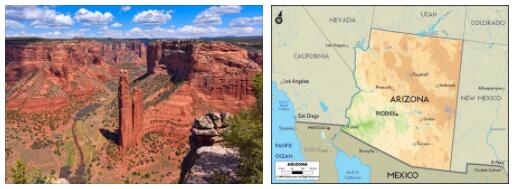Arizona flags
The state flag of Arizona was designed and adopted in 1927. It is divided into two halves.
The upper part consists of thirteen alternating yellow and red rays that represent the thirteen original colonies of America. Because Arizona is a western state, the rays show the sun setting. The colors of the rays refer to the yellow and red in the Spanish flags carried by Coronado when he came to Arizona in the sixteenth century.
The bottom half of the flag is a pure blue area, the same color as the blue in the flag of the United States of America.
A large star-colored copper is applied in the center of the flag. This identifies Arizona as the largest copper producer in the United States.
Arizona geography
The landforms that the Arizona landforms took millions of years to develop, and when the land ceased its restlessness, a pattern of great variety and contrast, covered the land.
The Colorado Plateau, a series of plains, gorges, mountains, and valleys, extend south into Arizona and cover most of the northern half of the state. Black Table Mountain, Painted Desert and Monument Valley in northeastern Arizona are some of the most interesting areas of the plateau.
Scattered wood-covered Rocky Mountain wind ranges across the Plateau, including the Black, San Francisco and White Mountains. Humphreys Peak is the highest point at 12,633 feet.
The state’s most dramatic feature, the Grand Canyon, snakes through the northwest corner. Carved deep into the earth by wind and water, it is estimated to be over 5 million years old.
Moving south towards the Phoenix area, the land begins to flatten some. Corrode the painted peaks of the Big Horn, Gila and Superstition Mountain give way to boulders, bushes and cactus saguaro and the magnificent scenery of the Sonoran Desert.
The Colorado River forms much of Arizona’s western border with California and Nevada. It also runs through the heart of the Grand Canyon. Additional size rivers include the Little Colorado, the Gila, and the Salt.
